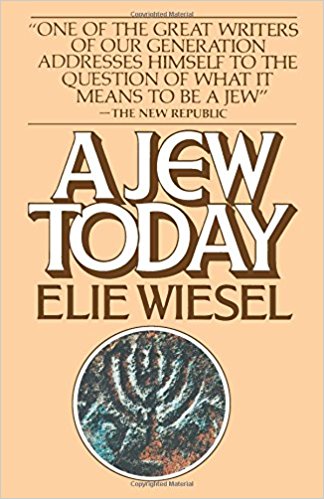Elie Wiesel: A Retrospective, Week #7
 Elie Wiesel’s A Jew Today originally appeared as Un Juif Aujourd’hui in 1978. The book is a collection of essays, stories, diary entries, portraits, and dialogues written between 1971 and 1978. These short pieces describe an evolving understanding of Jewishness woven out of current events, history, and memory. Wiesel writes about a wide variety of topics, including Israel in the aftermath of the wars of 1967 and 1973, global conflicts, and the Soviet dissident Aleksandr Solzhenitsyn. Each essay reflects Wiesel’s passionate political views and personal philosophies, and we hope our selected passages this week will inspire thought and discussion.
Elie Wiesel’s A Jew Today originally appeared as Un Juif Aujourd’hui in 1978. The book is a collection of essays, stories, diary entries, portraits, and dialogues written between 1971 and 1978. These short pieces describe an evolving understanding of Jewishness woven out of current events, history, and memory. Wiesel writes about a wide variety of topics, including Israel in the aftermath of the wars of 1967 and 1973, global conflicts, and the Soviet dissident Aleksandr Solzhenitsyn. Each essay reflects Wiesel’s passionate political views and personal philosophies, and we hope our selected passages this week will inspire thought and discussion.
Passage #1:
From “To be a Jew”:
I knew what it meant to be a Jew in day-to-day life as well as in the absolute. What we required was to obey the Law; thus one needed first to learn it, then to remember it. What was required was to love God and that which in His creation bears His seal. And His will would be done.
(…)
With the years I learned a more “sophisticated,” more modern vocabulary. I was told that to be a Jew means to place the accent simultaneously and equally on verb and noun, on the secular and the eternal, to prevent the one from excluding the other or succeeding at the expense of the other. That it means to serve God by espousing man’s cause, to plead for man while recognizing his need of God. And to opt for the Creator AND His creation, refusing to pit one against the other. (6-7)
Passage #2:
From “To be a Jew”:
Of course, man must interrogate God, as did Abraham; articulate his anger, as did Moses; and shout his sorrow, as did Job. But only the Jew opts for Abraham―who questions―AND for God―who is questioned. He claims every role and assumes every destiny: his is both sum and synthesis. (7)
Passage #3:
From “Zionism and Racism,” written in response to the UN Resolution 3379, adopted in November of 1975, which “determine[d] that Zionism is a form of racism and racial discrimination.” The Resolution was revoked in 1991. Wiesel wrote:
We are told that this is not about Jews, but about Zionists. That, too, is hardly new. They try to divide us, to pit us one against the other after having pitted us against the world.
There was a time when the Jews of Germany were told: We have nothing against you, our resentment is directed solely against the Jews of Poland, who refuse to be assimilated. Later the Jews of France were told: You have nothing to fear, our measures are aimed only at German Jews, they are too assimilated. Later the Hungarian Jews were reassured: We are not interested in you but in your coreligionists in France; they are making trouble there…
It was all a lie, and now we know it. They meant all of us, everywhere and always. (42)
Passage #4:
From “Dodye Feig, A Portrait”:
One day, without a word to anyone, without thinking it over, I set out on foot to see him―I missed him so much. After an exhausting march of several hours I entered his farm, out of breath, and sank into a chair.
Concealing his surprise, he simply inquired whether my mother knew. “No? And your father, not he either?” He frowned. “Fine. First of all we shall send a message with the first coachman returning to town; then you and I shall talk.”
And at dusk, after prayers and the meal, he made me sit before him. “Do as I do,” he told me. “When I stand before my Rebbe, I remove my veils and tell him everything, it does me good. Tell me everything, it will do you good.” Without humiliating me or scolding me, he questioned me about the reasons for my escapade. I answered as best I could: “I missed you, Grandfather.” ― ”Is that the real reason, the only one?” ― ”Yes, Grandfather, the only one.” (78)
The stories I most like to tell are the ones I heard from my grandfather. I owe him my love of tradition, my passion for the Jewish people and its unfortunate children. And he, who never read a novel, is a presence in my novels. My old men often bear his features, sing the way he did and, like him, disarm melancholy with the magic of words. (80)
Passage #5:
From “The Scrolls, Too, are Mortal.” A conversation with a scribe:
“Memory,” he says, “yes, it sometimes lets itself be devoured by the imagination. I like both, but separately.” He reaches for a pen, hesitates, sets it down again. “One must not trust memory too much; it is faithful only to the extent that we are faithful to it.”
The last sentence makes me jump: I had heard it before, long ago. “Memory,” he had added then, “memory is our real kingdom.” (85)
Please join us for the next week of selected passages at our Facebook!